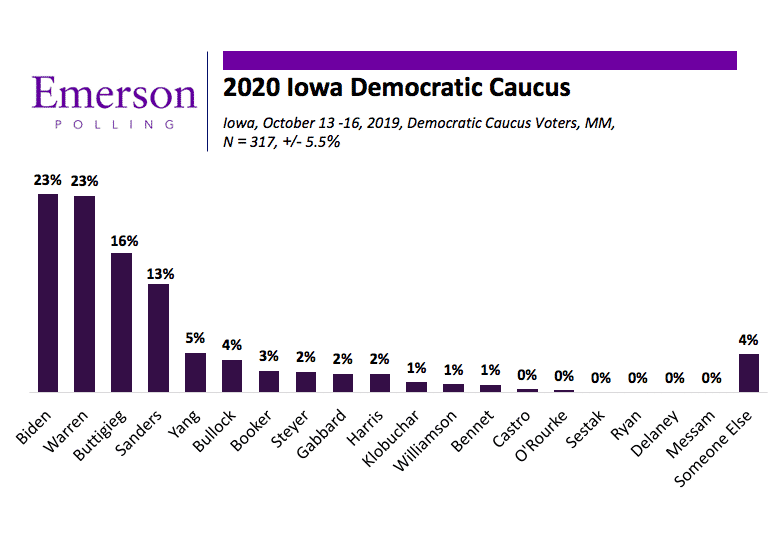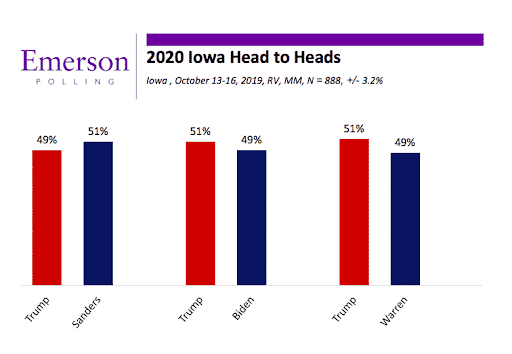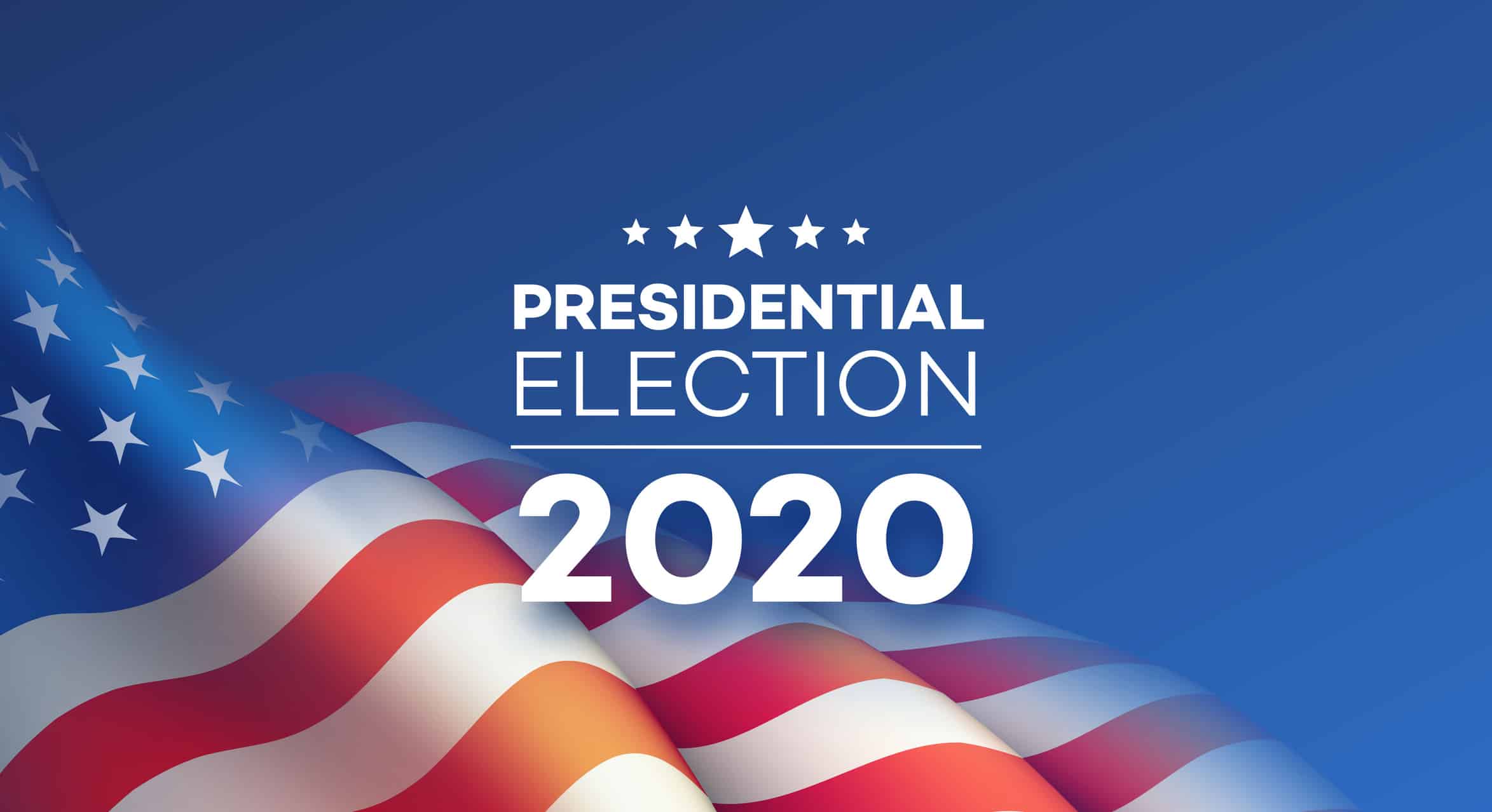In the first caucus state of the 2020 presidential election, the Democrat Primary field has shifted since the last Emerson poll in March. Former V.P. Joe Biden is now tied with Sen. Elizabeth Warren for the lead 23% each, followed by Mayor Pete Buttigieg at 16%, and Sen. Bernie Sanders dropping to fourth at 13%. No other candidate reaches above 5%. (n=317, +/-5.5%, MM, Oct 13-16, 2019)

According to Spencer Kimball, Director of Emerson Polling, “The good news for Biden is he did not lose much ground since March’s poll that had him at 25% of the vote. It appears that Warren has been the beneficiary of Sanders’s drop from 24% to 13%; Mayor Pete appears to have solidified his base in Iowa, going from 0% in February, to 11% in March, and now 16% in the Hawkeye state.”
Warren has also overtaken Sanders among voters under the age of 50. 21% of those under 50 support Warren followed by Sanders at 18%. Biden continues to lead with those over 50 – receiving 33% support from this cohort, followed by Warren at 24%.
Warren also now leads Sanders among those who supported the Vermont Senator in the 2016 caucus; Warren has 26% among this group, followed by Sanders at 19%, and Buttigieg at 16%. Among those who supported Hillary Clinton in the 2016 caucus, Biden captures 42%, followed by Warren at 22% and Buttigieg at 13%.
Income level is a driving factor in voter preference among the top candidates. Among those making less than $50,000 a year, Biden, Sanders and Warren are all at 20%. Among those making more than $50,000 a year, Sanders is at 8%, Warren is at 24% and Biden is at 25%.
President Trump holds a 47% disapproval and a 44% approval rating in Iowa while the Republican Governor Kim Reynolds is at 39% approval and 35% disapproval. Broken down, the President has a 52% disapproval among women, with a 39% approval, as compared to a 42% disapproval among men, with a 51% approval. A plurality of voters – 48 % – oppose impeachment with 42% supporting impeachment (n=829, +/- 3.3%).
In the GOP primary, Trump leads the field of four candidates with 93% of the vote. (n=286, +/- 5.7%)
In hypothetical head to head matchups, Trump has a slight advantage over Warren and Biden: 51% to 49%, while Sanders carries a 2 point advantage over Trump with 51% to 49%; all three match-ups are within the polls margin of error. (n=888, +/-3.2%)

The most important issue for voters in Iowa in deciding for whom to vote for president is the economy at 33%, followed by healthcare at 19% and social issues at 10%. Impeachment ranked 7 out of 9 at 6%, ahead of education at 5% and foreign policy at 3%. Among Democrats, the most important issue is health care at 25%, followed by the economy at 17% and the environment at 14%. The majority of Republicans (55%) identify the economy as the most important issue, followed by immigration at 14%. Independents are split between the economy (27%) and healthcare (24%).
“The Democrats have some work to do in Iowa convincing voters that impeachment is a top priority of Congress; 67% of Democrats in Iowa support impeaching the president, but only 10% identify it as the most important issue in deciding their vote for president,” added Kimball.
One in four voters (25%) said they have seen a presidential candidate in person, and, as expected, Democratic primary voters were more likely to have seen a candidate at 34%.
It is important for Iowans to be the first state in the Presidential nomination process to vote, 69% said it was important, while 31% said it was not important. There was no significant difference based on party affiliation and attitude toward the historic first in the nation caucus.
The Democratic Primary for US Senate is wide open with no clear frontrunner – 74% of Democratic primary voters are still undecided. Theresa Greenfield is at 11%, Michael Franken and Eddie Mauro are both tied at 6% while Kimberly Graham is at 4%.
In a potential head to head matchup against Sen. Joni Ernst, Greenfield trails 47% to 40% with 14% undecided.
Caller ID
The Iowa Emerson College poll was conducted October 13-16, 2019 under the Supervision of Emerson Polling Director and Assistant Professor Spencer Kimball. The sample consisted of registered voters, n=888, with a Credibility Interval (CI) similar to a poll’s margin of error (MOE) of +/- 3.2 percentage points. The data was weighted by gender, age, education, region and mode based on 2016 turnout modeling. It is important to remember that subsets based on gender, age, party breakdown, ethnicity and region carry with them higher margins of error, as the sample size is reduced. Data was collected using both an Interactive Voice Response (IVR) system of landlines only (n=571) and an online panel provided by Amazon Turk and Dynata (n=317).







